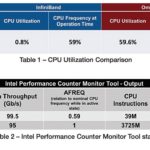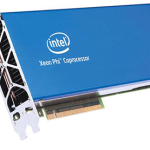“Increased system size and a greater reliance on utilizing system parallelism to achieve computational needs, requires innovative system architectures to meet the simulation challenges. As a step towards a new network class of co-processors intelligent network devices, which manipulate data traversing the data-center network, SHARP technology designed to offload collective operation processing to the network. This tutorial will provide an overview of SHARP technology, integration with MPI, SHARP software components and live example of running MPI collectives.”
Offloading vs. Onloading: The Case of CPU Utilization
One of the primary conversations these days in the field of networking is whether it is better to onload network functions onto the CPU or better to offload these functions to the interconnect hardware. “Onloading interconnect technology is easier to build, but the issue becomes the CPU utilization; because the CPU must manage and execute network operations, it has less availability for applications, which is its primary purpose.”
InfiniBand: When State-of-the-Art becomes State-of-the-Smart
Scot Schultz from Mellanox writes that the company is moving the industry forward to a world-class off-load network architecture that will pave the way to Exascale. “Mellanox, alongside many industry thought-leaders, is a leader in advancing the Co-Design approach. The key value and core goal is to strive for more CPU offload capabilities and acceleration techniques while maintaining forward and backward compatibility of new and existing infrastructures; and the result is nothing less than the world’s most advanced interconnect, which continues to yield the most powerful and efficient supercomputers ever deployed.”
It’s Here: The Print ‘n Fly Guide to SC16 in Salt Lake City
At insideHPC, are very pleased to publish the Print ‘n Fly Guide to SC16 in Salt Lake City. We designed this Guide to be an in-flight magazine custom tailored for your journey to SC16 — the world’s largest gathering of high performance computing professionals. “Inside this guide you will find technical features on supercomputing, HPC interconnects, and the latest developments on the road to exascale. It also has great recommendations on food, entertainment, and transportation in SLC.”
Offloading vs Native Execution on Intel Xeon Phi Coprocessors
“Native execution is good for application that are performing operations that map to parallelism either in threads or vectors. However, running natively on the coprocessor is not ideal when the application must do a lot of I/O or runs large parts of the application in a serial mode. Offloading has its own issues. Asynchronous allocation, copies, and the deallocation of data can be performed but it complex. Another challenge with offloading is that it requires memory blocking. Overall, it is important to understand the application, the workflow within the application and how to use the Intel Xeon Phi coprocessor most effectively.”
Mellanox Introduces BlueField SoC Programmable Processors
Today Mellanox announced the BlueField family of programmable processors for networking and storage applications. “As a networking offload co-processor, BlueField will complement the host processor by performing wire-speed packet processing in-line with the network I/O, freeing the host processor to deliver more virtual networking functions (VNFs),” said Linley Gwennap, principal analyst at the Linley Group. “Network offload results in better rack density, lower overall power consumption, and deterministic networking performance.”
Slidecast: Advantages of Offloading Architectures for HPC
In this slidecast, Gilad Shainer from Mellanox describes the advantages of InfiniBand and the company’s off-loading network architecture for HPC. “The path to Exascale computing is clearly paved with Co-Design architecture. By using a Co-Design approach, the network infrastructure becomes more intelligent, which reduces the overhead on the CPU and streamlines the process of passing data throughout the network. A smart network is the only way that HPC data centers can deal with the massive demands to scale, to deliver constant performance improvements, and to handle exponential data growth.”










